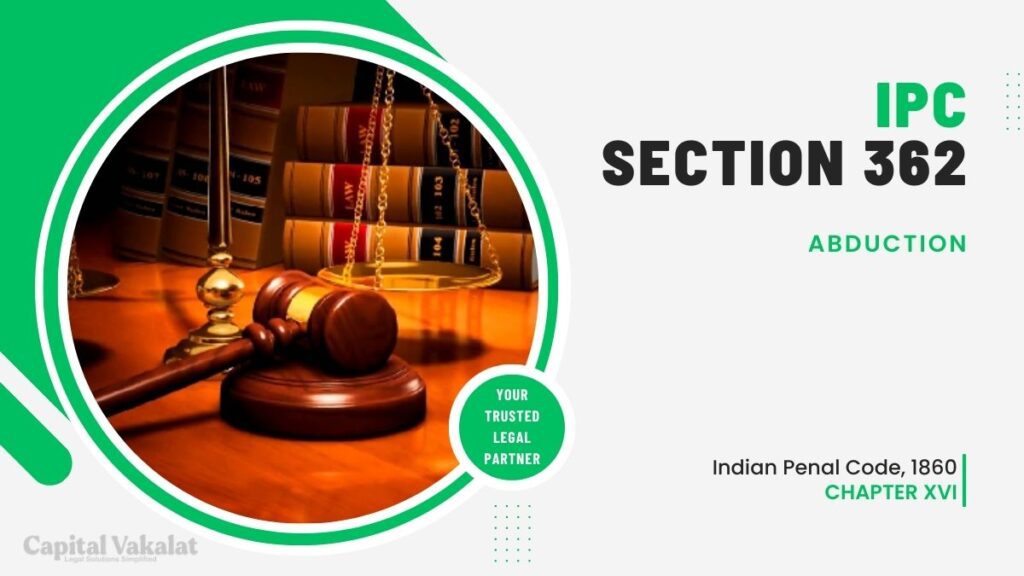Abduction, as defined under Section 362 of the Indian Penal Code (IPC), is a legal term that carries significant weight in the realm of criminal law.

This article aims to provide a comprehensive understanding of Section 362 IPC, shedding light on its key elements, various forms, legal consequences, and the impact on victims.
Key Elements of Section 362 IPC
Section 362 IPC encompasses a set of legal provisions that define and penalize abduction. To grasp the intricacies, it’s crucial to explore the criteria that qualify an act as abduction. According to the statute, abduction involves the taking away of a person against their will, and understanding these key elements is fundamental to navigating the legal landscape.
Different Forms of Abduction
Abduction manifests in various forms, ranging from physical abduction to more nuanced legal abductions. Physical abduction involves the actual taking away of a person, while legal abductions may involve custodial disputes or other legal intricacies. Each form carries its own set of legal consequences, and it’s essential to comprehend the distinctions to navigate the legal repercussions effectively.
Case Studies
Real-life examples serve as powerful illustrations of the practical implications of Section 362 IPC. Examining selected cases provides insights into the outcomes, legal precedents, and the lessons learned from these situations. These case studies not only elucidate the legal aspects but also humanize the impact of abduction on individuals and communities.
Penalties and Punishments
The severity of punishments under Section 362 IPC is a critical aspect that demands attention. Understanding the factors influencing the quantum of punishment is essential for legal practitioners, scholars, and the general public. This section delves into the gradation of penalties, ensuring a nuanced perspective on the consequences of abduction under the law.
Legal Defenses Against Abduction Charges
While the law defines and penalizes abduction, legal defenses exist to protect individuals wrongfully accused. Exploring these defenses and understanding the nuances can make a significant difference in the outcome of legal proceedings. Supported by case laws, this section aims to equip readers with insights into effective defense strategies.
Impact on Victims
Beyond the legal ramifications, abduction has profound psychological effects on victims. Understanding the trauma and challenges faced by those who have experienced abduction is crucial for building empathy and support systems. This section explores the psychological dimensions of abduction and highlights initiatives aimed at helping victims cope and recover.
Evolving Legal Landscape
The legal landscape is dynamic, with laws evolving to address societal changes. This section examines recent amendments or changes in abduction laws, providing readers with an up-to-date perspective on the subject. Emerging trends in legal interpretations shed light on the direction in which abduction laws are headed.
Public Awareness and Education
Public awareness plays a pivotal role in preventing and addressing abduction cases. Initiatives and campaigns aimed at educating the public about abduction laws can contribute to a safer society. This section emphasizes the importance of awareness and showcases successful campaigns that have made a positive impact.
Conclusion
In conclusion, Section 362 IPC is a critical component of India’s legal framework, addressing the grave issue of abduction. This article has explored the key elements, different forms, case studies, penalties, legal defenses, impact on victims, the evolving legal landscape, and the need for public awareness. By understanding and actively engaging with these aspects, we can collectively contribute to a society that values and protects its members.
Frequently Asked Questions
What are the primary legal defenses against abduction charges?
Legal defenses may include consent, mistaken identity, and lack of intent. Consulting legal experts is crucial for a robust defense.
How can the public contribute to preventing abductions?
Public awareness, reporting suspicious activities, and supporting initiatives promoting child safety are effective ways to contribute.
Are there specific support systems for abduction victims?
Yes, various organizations and counseling services provide support to abduction victims and their families.
Can legal actions be taken against false abduction accusations?
Yes, individuals falsely accused of abduction can pursue legal remedies to clear their name and seek justice.